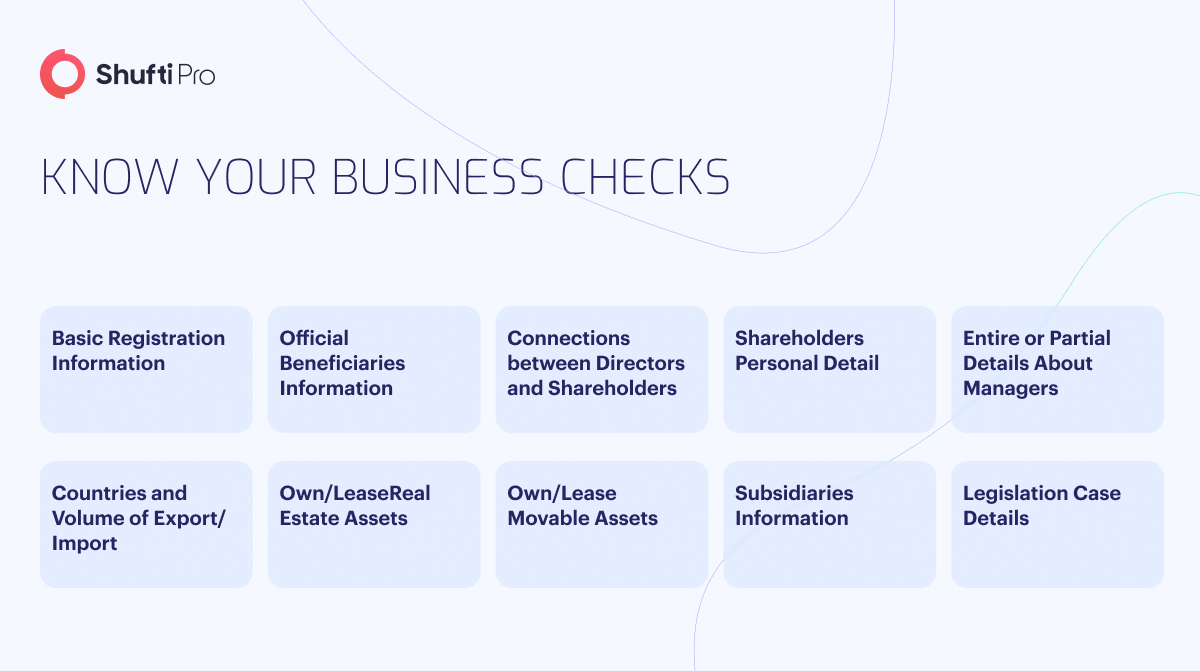Know Your Business (KYB) | Ensuring Financial Security

- 01 What is Know Your Business (KYB)?
- 02 The History of Know Your Business Regulation
- 03 Understanding the Regulatory Landscape for KYB Verification Checks
- 04 The Benefits of KYB: Ensure Financial Security
- 05 Who Can Benefit from Know Your Business Measures?
- 06 The Best Practices for Successful KYB
- 07 Know Your Business Checks During Onboarding
- 08 Know Your Business in the Digital Age
- 09 How Can Shufti Help Ensure Financial Security?
The Know Your Business solution standard verifies a company’s legal standing and confirms its legitimacy. A regulated organisation, like a bank or insurance firm, conducts the KYB procedure to defend its interests and confirm whether they are working with legitimate or fictitious businesses. A report revealed a 40% increase in fraudulent financial transactions between 2021-2022 alone.
An organisation can assure authenticity whilst safeguarding against unethical or fraudulent business practices by understanding the background of the company they are working with. Additionally, it stops financial crimes, including money laundering and terrorist financing.
What is Know Your Business (KYB)?
Know Your Business (KYB) is a technique used by companies to comprehend the enterprises or organisations they are collaborating with and to lower the risk of money laundering, as well as other criminal activities that those businesses might be involved in. The KYB verification procedure enables businesses to comply with their legal requirements under the EU’s 6AMLD and other comparable international regulations.
The suppliers, shareholders, beneficiaries, and other businesses with connections to the company doing the check might all be the subject of KYB checks. They provide the confidence and trust necessary to bring on new business partners. The corporate version of Know Your Customer KYC Verification, formally called Know Your Business (KYB), enables enterprises to confirm the identity of their clients and strengthen AML compliance.
The History of Know Your Business Regulation
The AML-CTF regulatory framework, which began to gain importance in the late 20th century, is where the idea of KYB first evolved. This was a reaction to growing worries about the misuse of the international financial system for illegal purposes. These laws changed over time, and it became obvious that firms needed to “know” their clients and rival businesses. This led to the Know Your Customer (KYC) and, later, the KYB rules, which sought to confirm the identities of people and organisations engaged in financial transactions.
Understanding the Regulatory Landscape for KYB Verification Checks
The KYB solution is a relatively new concept or a part of legislation. The Know Your Customer KYC regulations have been in place for many years, but only recently have businesses been required to go through the same detection.
Due to several international rules, businesses and financial institutions must comply with KYB checks. Numerous anti-money laundering (AML) and counter-terrorism funding laws, including the USA Patriot Act and the Sixth Anti-Money Laundering Directive of the European Union, expressly call for thorough KYB checks. Businesses that violate these regulatory criteria may suffer severe penalties, such as financial fines, the loss of business licences, and even the detention of responsible authorities. The criteria for customer due diligence for financial companies were last updated just over a year after the US FinCEN included KYB laws in the regulation
Nevertheless, KYB needs a more uniform regulatory environment. It differs between geographical areas, unregulated industry, and legal systems, each with its own laws and regulations. Due to this, firms must comprehend and successfully adapt their KYB strategies to each country’s distinct legal and regulatory requirements. This becomes increasingly important for multinational firms and those seeking worldwide expansion.
The Benefits of KYB: Ensure Financial Security
KYB processes deliver multiple benefits. These include:
Legal Compliance
Businesses that use KYB procedures ensure they comply with 6AMLD and AML requirements.
Lower Chance of Fines
In 2021, the total penalty for financial offences was $9.95 billion. Companies that follow KYB standards are less likely to indulge in such fines than those that don’t.
Protection of Reputation
Businesses can enjoy peace of mind, realising they have done everything possible to prevent their reputation from being harmed by participating in a financial crime by adopting a robust strategy to KYB.
Greater Growth Potential
Businesses that form safe, dependable alliances with other companies may find themselves well-suited for expansion when the time is right.
Less Money Laundering
KYB procedures make it more difficult for criminals to commit financial crimes, including terrorist financing and money laundering. The entire business sector can boom from this.
Reduced Corruption
Because of the transparency that comes with KYB compliance, corruption is more difficult to cover up, eventually resulting in low or no corruption in the sector.
Risk Reduction
KYB checks assist in recognising and prohibiting potential fraud, money laundering, terrorist financing, and other illicit activity. They protect the company’s income and reputation from any financial losses and legal cases.
Compliance with Regulations and Penalty Avoidance
Businesses can avoid fines for non-compliance by adhering to appropriate regulatory standards with adequate KYB checks.
Enhanced Commercial Relationships
Thorough KYB checks increase transparency, which promotes confidence and strengthens partnerships in business connections.
Who Can Benefit from Know Your Business Measures?
Financial institutions must put Know Your Business policies into place. As a result, KYB processes directly help banks, insurance firms, and other similar businesses by safeguarding their business operations. They can employ KYB procedures to ensure they work with legitimate businesses with well-defined structures rather than fraudulent companies that pass off illegal profits as legitimate earnings.
Other than that, numerous legislators have ensured that KYC and KYB requirements are also placed on other categories of businesses that are thought to pose a danger of money laundering. These consist of gambling platforms, cryptocurrency brokerage firms, antiques merchants, real estate firms, and so forth.
Having said that, the institutions using KYB methods are not the only ones who profit. When procedures like KYC and KYB verification make the working environment safer, both the international business community and society as a whole take advantage of it. Additionally, business clients increase since they are less likely to be responsible for losses caused by money laundering and other illicit financial activity.
The Best Practices for Successful KYB
KYB technique must follow industry standards to be successful. For instance:
Definite KYB Policies
Establish a comprehensive Know Your Business strategy that outlines the organisation’s KYB plan of action, identifies who is liable for what, recognise the data that will be gathered, and describes the process for assessing risk.
Risk-Based Methodology
Apply a risk-based approach to KYB by tailoring internal controls and safeguards to the level of risk posed by each customer, supplier, or business partner. This enables organisations to prioritise the dangers to their business and focus investments on where they will be most useful.
Leverage Advanced Technology
By incorporating cutting-edge technical solutions, KYB procedures can be made more effective. Automation, AI, and ML integration may make KYB initiatives more accurate, timely, and cost-effective.
Monitor and Examine
To ensure KYB procedures deliver the expected results and meet risk as well as compliance management objectives, businesses should constantly review them. These actions include regular system health audits and preventative measures implementation.
Know Your Business Checks During Onboarding
Comprehensive KYB checks are carried out after the first business registration and confirmation. These checks confirm the addresses, corporate phone numbers, and funding sources of the onboarding clients for businesses.
The gathered data is then cross-referenced for accuracy. Based on this confirmed data, a risk assessment is carried out to determine any possible risk connected with a prospective company partner. Thorough KYB checks become essential during the entire corporate onboarding process.

Know Your Business in the Digital Age
Verifying business entities necessitates a lot of data, which can be time-consuming if done manually. This lengthens the process and considerably raises the possibility of human error. Many automated KYB solutions enable human employees to utilise digital tools to bypass the time-consuming onboarding procedure because automation can complete this task in only a few seconds.
Some methods, such as Electronic Identity Verification (eIDV), swiftly verify an individual using publicly accessible and private databases. This can be compared to the company’s employee list to check for inaccurate information.
How Can Shufti Help Ensure Financial Security?
KYB checks are essential for preventing financial fraud and promoting open communication among business partners. KYB checks are more important to business operations as worldwide businesses have adopted digital transformation. With the development of big data analytics, blockchain, and AI, effective, intelligent screenings are the future for KYB verification checks.
To reduce the likelihood of money laundering and securing finance, Shufti offers a KYB solution that screens businesses against 1700+ worldwide watchlists. Our AI-powered KYB solution quickly executes checks against PEPs, UBOs, and people who have received adverse media listings. It not only deters criminals, but it also makes it easier for the financial sector to promptly comply with regulations.
Need to ensure financial security whilst staying compliant?

 Explore Now
Explore Now













